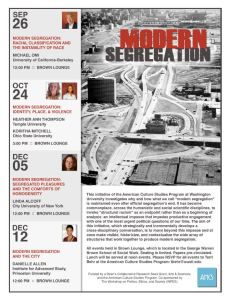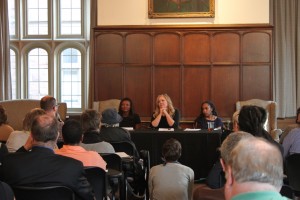The American Culture Studies (AMCS) program at Washington University in St. Louis has launched a dynamic project on Modern Segregation. AMCS Director Iver Bernstein and his collaborators, including professor Rebecca Wanzo, created a lecture series to fuel deeper conversations about racial realities in St. Louis and Ferguson, the United States and beyond. On Friday, October 24th, I had the honor of sharing the stage with award-winning historian Heather Ann Thompson to contribute to this important ongoing discussion.
Our contributions centered on Identity, Place, and Violence. My remarks were adapted from my Callaloo article “Love in Action” about the parallels between lynching and anti-LGBT violence. Dr. Thompson urged us to interrogate what “violence” means in the age of segregation and mass incarceration. Quite powerfully, she noted that when Americans say “violence,” we often do NOT mean the state-sanctioned violence visited on people of color. As Americans, we ignore that violence and instead pretend that communities of color are violent and would benefit from learning from whites. With research about our current historical moment as well as mounds of evidence from U.S. history, Dr. Thompson gave us much to consider as citizens who want to see our nation live up to its creed.
 The larger Modern Segregation project will yield public engagement of various forms. The lecture series that Dr. Thompson and I enjoyed contributing to includes Michael Omi (co-author of the foundational Racial Formation in the United States: From the 1960s to the 1990s), renowned philosopher Linda Alcoff, and Princeton University political theorist Danielle Allen.
The larger Modern Segregation project will yield public engagement of various forms. The lecture series that Dr. Thompson and I enjoyed contributing to includes Michael Omi (co-author of the foundational Racial Formation in the United States: From the 1960s to the 1990s), renowned philosopher Linda Alcoff, and Princeton University political theorist Danielle Allen.
On our last night in town, Heather asked architectural history scholar Michael Allen to take us to Ferguson, the place that has captured so much of our attention and made our areas of expertise feel painfully relevant. I won’t try to capture what that time meant to me. However, several friends and colleagues have supported the protestors in Ferguson by joining them. Because I couldn’t go, I contributed to the fundraising campaign that helped sustain them while on the road and allowed them to donate additional funds to organizations in the area. I read their various accounts with interest, and I was humbled to see and feel a bit of what they described.
The more I think about what my colleagues in AMCS at Washington University are calling “Modern Segregation,” the more amazed I am by how much faith people of color continue to have in this country’s capacity for justice. We certainly prove that faith is about hoping despite the evidence you can see. Now, THAT is visionary.



